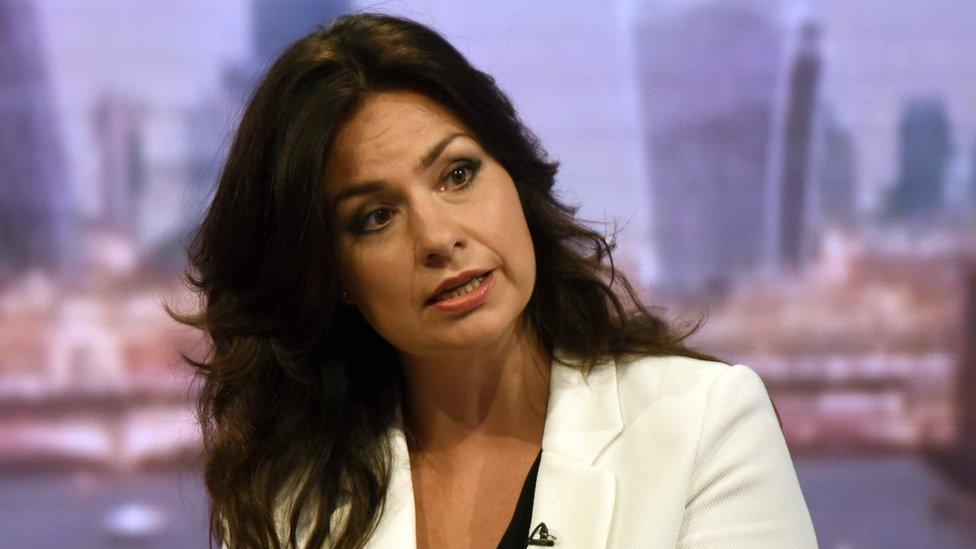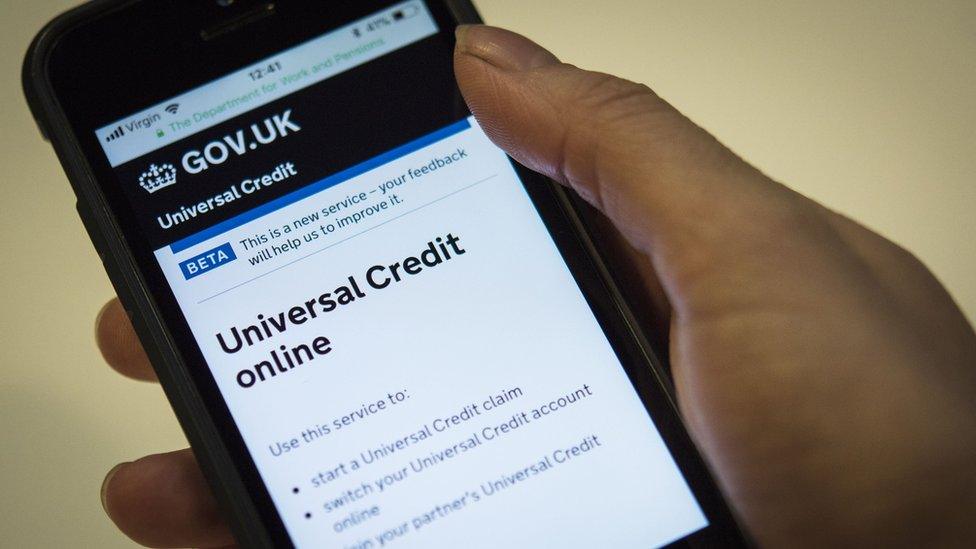Universal Credit: Chancellor pressured over welfare system
- Published

Tory MP Heidi Allen says the system "isn't right"
Chancellor Philip Hammond is facing increasing pressure from Conservative MPs to find extra funding for Universal Credit in his upcoming budget.
Tory MP Heidi Allen told the BBC some 30 colleagues had expressed concerns about the flagship welfare system.
Reports say 3.2 million households could lose £48 a week under the system, which merges six working-age benefits.
The work and pensions secretary has admitted it could leave some worse off but defended the system.
Esther McVey said the most vulnerable would be protected, and people could take on more work to increase their income.
The government has set aside £3.1bn to help people affected by the transition to Universal Credit. However, there are still fears families will face hardship.
And the architect of the system, former work and pensions secretary Iain Duncan Smith, has said it needs a further £2bn cash injection to enable it to work properly.
Currently being phased in across the UK, Universal Credit is aimed at making the benefits system simpler and more flexible - so people who are able to work are rewarded for doing so.
It has been criticised for running over budget and causing delays to people's payments, but the plan is to move all existing benefit claimants on to it next year.

Analysis
by Matthew Cole, BBC political correspondent
With two weeks until the Budget, calls for the chancellor to address concerns about Universal Credit are growing.
Which raises two questions: Will he stump up some cash? And if so, where will he find it?
Philip Hammond has hinted he could raise taxes... and possibly cut relief on pension contributions.
But whilst that might appease those worried about Universal Credit, he could end up angering "low-tax Tories" elsewhere in the Parliamentary party.
Clearly, he has a tough balance to keep all sides of his party happy.
But if the chancellor decides against including cash in his Budget for the flagship welfare reform, the government might face trouble in the Commons next month.
Votes are scheduled on measures connected to the migration of claimants onto Universal Credit - which could be an opportunity for unhappy MPs to rebel.

Maria Amos, from Liverpool, told BBC Radio 4's PM programme she had had to wait five weeks to get her payment, which had led to feelings of hopelessness.
"I was so frightened," she said. "I didn't know how I was going to cope.
"I [asked], 'can you explain this to me', but they didn't. They [just said] it is the way the system works.
"[In that time] I got behind with my rent by over £400 [and] I wasted away."
Ms Allen, a member of the work and pensions select committee, told BBC Radio 4's Today programme: "Significant numbers of colleagues on my side of the House are saying this isn't right and are coming together to say the chancellor needs to look at this again."
Mr Hammond, who will announce his budget at the end of the month, has hinted he could target tax relief on pension contributions to find extra funds, calling the measure "eye-wateringly expensive".
'More losers than winners'
Torsten Bell, director of the Resolution Foundation - which has carried out numerous studies on the benefit - said the purpose of Universal Credit was a good one, aiming to simplify welfare and make sure people were not losing money by returning to work.
But he told Today: "The problem is that a benefit that was meant to do that... has then had cuts added to it [by former chancellor George Osborne in 2015], and it now means there will be more losers than winners."
Ms Allen said she wanted her party to have the "political nerve" to remove the triple-lock protection for pensions, which she said cost the government £3bn a year.
The triple-lock sees the state pension rise in line with wages, inflation or by 2.5% - whichever is highest.
'Sound principles'
The warning from Tories comes after a number of senior political figures attacked Universal Credit this week, including former Conservative Prime Minister Sir John Major and former Labour premier Gordon Brown.
A government spokesman said ministers were listening to concerns but defended Universal Credit, stressing it was based on "the sound principles that work should always pay and those who need support receive it".
Labour leader Jeremy Corbyn has said he would stop the nationwide roll-out immediately and propose a "more comprehensive system."
- Published1 August 2018

- Published3 August 2018

- Published7 October 2018
